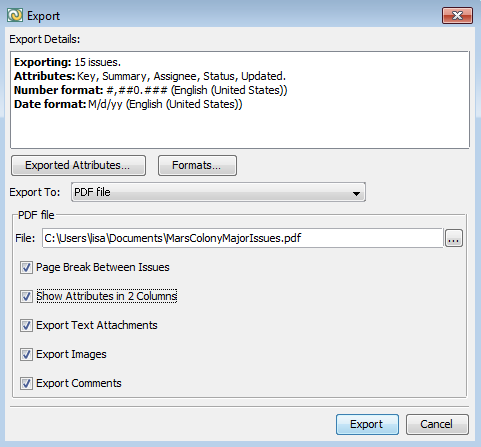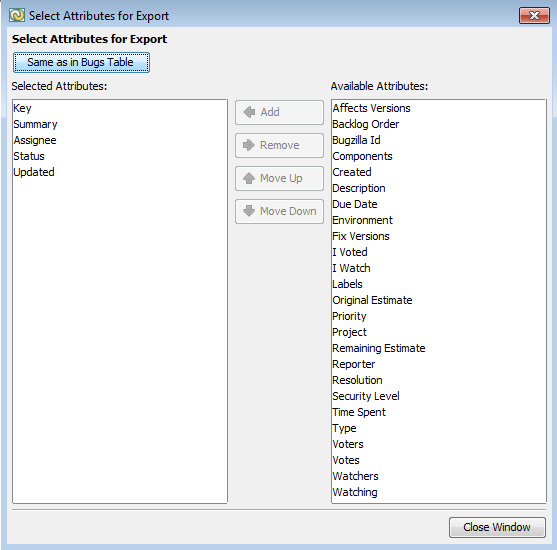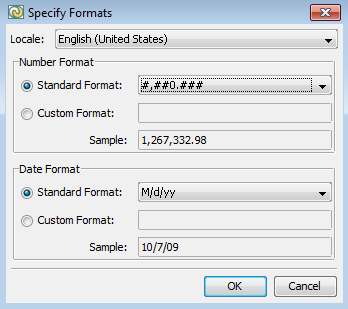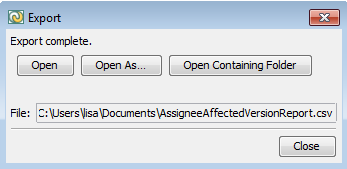Exporting Issues
JIRA Client lets you export queries and distributions information into a file of a desired format which you can later open or print out. The following output formats are supported:
- CSV (for opening in Microsoft Excel or Open Office),
- HTML (for opening in a web browser),
- PDF (for printing and viewing in, for example, Adobe Reader),
- XML (for further automated processing).
Export vs quick export
Export command lets you export currently open query or distribution to a file plus specify a number of parameters, in particular, output format and its settings whereas quick export allows to export issues silently with previously selected export settings.
Exporting Issues
To export issues:
- Select a desired query or distribution in the Navigation Area and double-click it to open in the Issues Table.
- Do one of the following:
- Click Export Issues button
 on the Issues Table toolbar.
on the Issues Table toolbar. - Select Tools | Export menu item.
- Press Ctrl + Shift + E (⌘ + E).
The Export dialog opens.

The upper part of the dialog provides a summary of export settings (issues attributes and output format) defined in its lower part. Settings which you see in the lower part of the dialog depend on a selected output format.
- Click Export Issues button
- Click the Exported Attributes... button to open the Select Attributes to Export dialog and set up the fields of the Issues Table you want to see in the resulting report.
 !
! - Click the Formats... button to open the Specify Formats dialog and select the report locale, number and date format.

- From the Export To drop-down list, select a desired output file format and specify its settings.
If you select Create a temporary file option, the report file is removed on application exit.
- Click Export, navigate to a resulting report, and use an associated application to open it.
Quick Export
To perform quick export:
- Select a desired query or distribution in the Navigation Area and double-click it to open in the Issues Table.
- Click Quick Export button
 on the Issues Table toolbar.
on the Issues Table toolbar.
The report is created and opens in an associated application or an Export dialog appears letting you navigate to the resulting report.

Custom Copy Issue
Since: JIRAClient 3.2
You may specify a custom pattern to copy selected issues to clipboard as text. The action appears in popup menu if system property 'action.customcopy.pattern' has not empty value.
- Select Tools | System Properties
- Add new property with name 'action.customcopy.pattern'. Enter pattern (see below) in value column.
- Optional. Add new property with name 'action.customcopy.name'. Enter desired action name in value column.
- Press Enter and Save button to close dialog and apply your changes.
Changes to these properties take effect immediatly. No application restart is require.
Pattern
When the custom copy action is invoked the pattern is applied to each selected issue. Escape sequences are replaced with controlling charcters and references to issue fields are replaced with the issue values.
Issue Field References
Issue field reference is enclosed into dollar signs (example: $key$). Two adjucent dollar signs are replaced with single dollar sign ($$ becomes '$'). All unknown references are not replaced and processed as raw text.
Supported issue fields:
- $key$ issue key. Example: JCO-1018.
- $summary$ issue summary. Example: Customizable "copy to clipboard" action
- $url$ issue web URL. Example: https://jira.almworks.com/browse/JCO-1018
Escape Sequences
The following escape sequences are supported:
- \n replaced with new line
- \t replaced with tabulation
- double '\' charcted replaced with single '\' character.
Action Name
You may specify the action name with 'action.customcopy.name' property. Also you may specify mnemonic position with & sign.
Example
action.customcopy.pattern=<a href="$url$">$key$</a> $summary$
action.customcopy.name=Copy &HTML
<a href="https://jira.almworks.com/browse/JCO-1018">JCO-1018</a> Customizable "copy to clipboard" action
See Also